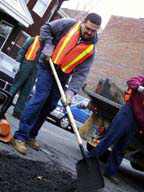Tow truck drivers are hard-pressed to remember a time when they’ve picked up more pot hole-damaged cars.
The mayor’s chief of staff bent a rim on a Jersey City road.
And the stretch of Paterson Plank Road that meets the Doric Apartments on the Jersey City/Union City border looks more and more like a mogul trail than a major truck route.
It’s ugly out there.
This past week, the city stepped up its efforts to patch up the worst gaping maws of asphalt, and the council could be considering a measure that would come down harder on developers and utilities who tear up the city streets.
Mayor Bret Schundler this week ordered the incinerator and parking authorities to aid the department of public works in patching holes over the next few weeks. The effort began about a week and a half ago.
Public works is responsible for the east and west ends, the Parking Authority is taking the north and the incinerator has the south.
Four crews of three men are using 11 tons of asphalt daily to fill the potholes, the city said.
Mayor Bret Schundler said a number of factors conspired to create the current mess.
“You’d have a 15 degree day followed by a 50 degree day,” he said, noting how the constant freezing and thawing serves to chew up the roads. That, and the “enormous amount of construction” and the reduced money the city was looking for in bonds have led to scale-backs in repaving projects.
For now, the city will be laying down “cold patch.” It’s essentially asphalt smoothed over with a pressure device called a “tamper.” No heat is used, since the ground is still too cold, and using heat would expand it and ruin the street.
So it’s a Band-Aid approach until warmer days, city officials said.
As an incinerator authority crew worked to fill holes on Park Street last week, Supervisor Brian Ward looked on. “If it rains hard afterward,” he said, gazing at the newly pressed cold patch, “it could wash it away.”
It may be several weeks before a permanent approach can be used. Schundler’s Chief of Staff, Tom Gallagher pointed to the third week in this month as a target date.
As for the construction end of matters, the worst problem the city faces is trench digging. You’ve seen it before. A perfectly good stretch of road is torn up to lay down a fiber optic line. Or the water or telephone company need to dig up the road. Whatever the case, the result is a filled-in road that is often inferior prior to the digging.
“It’s a known fact,” said public works director Kevin Sluka, “that as soon as you open up a roadway it immediately deteriorates.”
While companies like PSE&G have recently perfected techniques to make the seal between the trench and road more seamless, he said, there are scores of other companies who do a slipshod job. He thinks the new measure being crafted by the city will help improve the roads.
Several city sources say the new laws now being drawn up would make it harder for private companies to tear up the city’s streets and leave without doing an adequate job. For instance, if a person were to trip and fall on a poorly done road and sue the city, they could also sue the company responsible for the patch job. The companies may also have to put up money toward a “performance guarantee,” similar to what some developers pay. Additional inspection and a restoration fee to pay for wear and tear on the patches and trenches might also come out of a company’s pockets.
But that’s all in the future. As for now, cars will still have to negotiate around some of the divots, sinkholes and craters that have somehow become a new symbol in this city.
